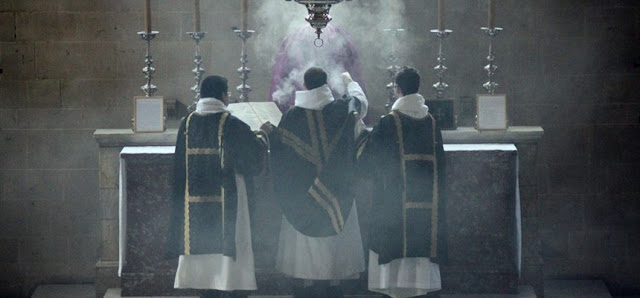Veils, Vernacular, and Culture: Death and All of its Friends.
You will often hear from people who lived through the
"great" 1960s reform of the Mass that, despite the loss of reverence
and sharp drop in attendance, it was good to have the Mass in the vernacular.
Surely understanding what goes on in the Mass is important. Surprisingly, this
is not the actual point of the Mass, but rather is a protestant revolt ideal.
Worship is directed to God, not man. Why has the vernacular been seen as
monumentally important to the Mass, even when attendance numbers have so
sharply declined? The answer can, in large part, be answered by the loss of
culture in our society.
We do
not have a true culture. We have worship of sports and celebrities, horrendous
"music", scandalous movies, illiteracy in all things classic,
smartphones for porn and games, and overall insanity. The loss of culture was
gradual. John Dewey's educational theory was the beginning of the end of
education. Communism the beginning of the end of the polis. Patriarchal
"do what I say, not what I do" parenting was perhaps a key igniter of
the sexual revolution. And vague Vatican II and post-conciliar documents
induced the beginning of the end of worship. That Latin was replaced with
vernacular speech, speech which was further brought to a grade four level, was
a dumbing down and complete change in direction of the Mass.
Once
upon a time William Shakespeare wrote plays on Julius Caesar or Timon of Athens
because his culture (note CULTURE) revelled in his wit and depth in such well
known stories. Ben Jonson's "Bartholomew Fair" is successful because
Dionysius' role in theatre is understood by its viewers. You know, those
viewers who are deemed illiterate by today's standards. Shakespeare, Jonson,
and many others produced great works because they worked within a culture. The
masses of "illiterates" they created for were steeped in centuries of
human achievements. The cultus, or tending, of the garden was alive and
well. The dramas, paintings, music, buildings, and thoughts of the day were
recognized as profound and worthy of immersing oneself in. It was not simple.
But it was worth it. It still is worth it.
There is perhaps less knowledge and wisdom now than at any other age of modern human history. Ease and instant understanding are the current crowning
achievement of life. Evidently depth and beauty are their casualties. What is
missing is the veil. The veil of mystery. The curtain separating instant
results and labourious enlightenments. The sacred mystically withheld from the
profane. If what we undertake must be instantly understood then by definition
this undertaking will be utterly void of depth and profundity. The grade four
vernacular Mass translation is what we are left with. I suppose it fits well with our "liturgical" Sing a Church into Being "hymns", which in turn provide great opportunities to daydream at Mass on how much money to place on the
Bears for the Monday Nighter. Repeat the non-culture wheel of misfortune.
What is
a veil? A veil is a covering. It is a rich occurrence seen throughout
Scripture. The Holy of Holies, or the Ark of the Covenant, are hidden. A
veiling essentially is a revealing. To veil something is to reveal it as
altogether important, sacred and worthy. Consider some veils which still exist
in the Tridentine Latin Mass, and to a far lesser degree in the Novus Ordo. The
chalice veil, tabernacle (tent), tabernacle veil, incense, holy week veiling,
altar server's velum for episcopal insignia, humeral veil, iconostasis,
narthex doors, and ad orientem worship. These postures and components
reveal a sacred mystery. They demonstrate that the Mass touches the Divine. It
is not human and earthly. It leads us to heaven. If there is no veil, there is
nothing to say. There is nothing to be revealed. To retranslate Shakespeare
into grade four speech, and remove all references to antiquity or virtue, is to
make Shakespeare inconsequential. The same danger applies to the Mass.
Latin
is a veil. It is not our mater lingua. You will not understand Latin at
first listen. Nor fiftieth listen. It takes great effort to understand Latin
fluently. Of course one can follow along with a pocket missal, but even that is
too much work for some. No, what is lost on today's Church is the truth that
Latin is a veil too. A veil that actually reveals heavenly mysteries. The
profound German writer Martin Mosebach explains one such instance:
"How amazed I was the first time I heard a Latin Te Deum. It was a lengthy piece, hovering to and fro, with its feather-light questioning and answering, a mixture of psalm, litany, and profession of faith […] The Latin Te Deum takes both listener and singer gently by the hand and leads them to a high mountain, where an unlimited vista opens out before them" (Heresy of Formlessness, p. 24).
An
unlimited vista. Grade four speech where every amplified breath of the priest
cannot be missed is certainly not an unlimited vista. Indeed, Latin is a veil.
It is a language for worship. We do not speak common tongue to worship the
heavenly God. We rather sing with the cherubim and seraphim. Did it matter to
the Irish that St. Patrick said the Mass in Latin? Was this a barrier? Or
maybe, just maybe, they recognized that Patrick was performing a ritual
sacrifice. That he was communicating with the Divine. Did they understand this?
Not fully. There is a veil. A paradoxical veil which is necessary to reveal.
As
instant gratification and factual demands weaned out the great depth of Western
culture, the Mass was not spared. Indeed, because of the need to understand
everything, we understand less than ever. The veil of Latin revealed the sacred
purpose of the Mass. Removing Latin from Mass did not make the Mass more
understandable, it simply lowered Mass to the level of uncultured banality.
Ratzinger says that "[w]henever people talk about inculturation, they
almost always think only of the liturgy, which then has to undergo often quite
dismal distortions. The worshippers usually groan at this, though it is
happening for their sake" (Spirit of the Liturgy, p.. 200-201). The
groanings are due to an absence of culture by which to inculturate.
Go ahead, take a proud stand against Latin in the Mass. While you're at it, hear every breath the priest utters. Listen to all the newly created
Eucharistic Prayers. Receive the unchanted words of the Gospel from the
sacerdotal podium from a priest who is always facing you, always telling you
exactly what he thinks is going on. Then sing this new Church into being, while not understanding a sacred thing. How utterly easy. How utterly insipid.
Remove the veil. Reveal a dead culture.
Remove the veil. Reveal a dead culture.
 |
| Photo Credit: catholic365.com |






Well said!
ReplyDelete